Site menu:

May 2009 Newsletter
Gronant Little Tern Colony.
April Bird News.
Forthcoming Events.
Latest Newsletter.
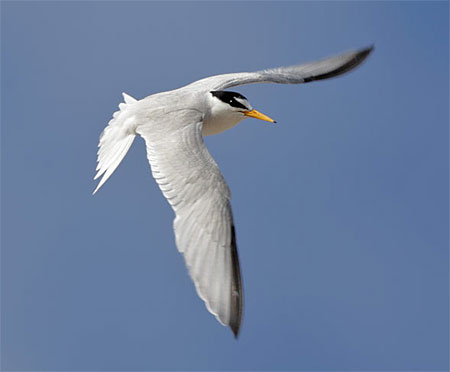
It was another good season at the Gronant Little Tern colony in 2008. The first birds were observed on May 4th with courtship noted a week later and the first nests seen around mid-May. As usual a further influx of birds (known by the wardens as the 'second wave') was observed in late May/early June when much increased displaying and nesting activity was recorded. Again as usual, a 'third wave' was noted around mid-July when a total of 350 birds were counted, it is assumed that this influx was of non-breeding two year old birds. This third wave is always welcomed by the wardens as the increased number of birds must help to protect the colony from avian predators.
101 pairs produced 104 fledglings, which is above average over the last 10 years for both figures. The graph below illustrates breeding success from when the colony was first wardened in 1975.
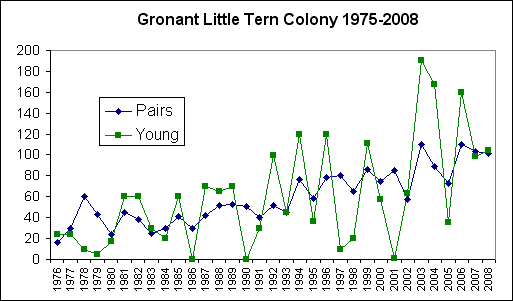
As is typical for all tern colonies, particularly Little Terns, breeding success can vary greatly from year to year, but the graph illustrates how much a success Gronant has been with a steady rise in breeding pairs. Elsewhere in the UK and across Europe this species is declining so it is very pleasing that at Gronant, Wales' only Little Tern colony, they are doing well.
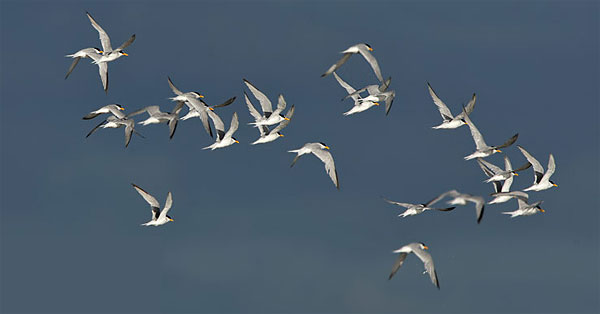
Gronant's success is due not only to the persistence of the Little Terns, but also to the wardening which has been carried out since 1975. The RSPB organised the wardening from 1975 to 2004, this was then taken over by Denbighshire Countryside Services in 2005 up to the present day. DCS employ three contract wardens for the summer with at least one on duty from 4am to 10pm, sometimes longer! Because the colony covers such a large area the help of additional wardens, in the form of volunteers, is vital. In 2008 these voluntary wardens spent a total of over 1,300 hours in all weathers and often during anti-social hours. I have been a voluntary warden at Gronant for 10 years now and always thoroughly enjoy it.
The main job of the volunteers is to keep an eye out for crows and kestrels and chase them away if they get too close to the terns. Sometimes the volunteers chat to visiting birdwatchers or holidaymakers and tell them about the birds. It's an enjoyable but usually not a particularly demanding job and I have to confess I spend a lot of time just watching the Little Terns and the other sea birds which include Common and Sandwich Terns, Arctic Skuas, Gannets, Manx Shearwaters and Common Scoters, on most days there are several Grey Seals just off the beach and very occasionally a dolphin or porpoise. Some volunteers get involved in counting nests, eggs, chicks and fledglings under guidance of the contract wardens.
If you are interested in becoming a voluntary warden please contact Adrian Hibbert by email (adrian.hibbert@denbighshire.gov.uk) or telephone 01745 356197.
Alternatively Denbighshire Countryside Services are holding Taster days, see below. These will be a good opportunity to get a feel of what will be involved. DCS are also looking for volunteer help to ready the colony area for the return of the terns - this will mainly involve putting up the fences which is quite a big job:
Wednesday 6th May & Saturday 9th May, 1pm - 3pm (both days).
Little Tern Volunteering Taster Day.
Gronant holds the only colony of Little Terns in Wales. Every year, volunteers help to protect these rare seabirds during the summer nesting period. These taster days will give you the opportunity to meet the Wardens and the volunteers and to get a feel for this important work.
Meet at Presthaven Sands Holiday Park entrance, Gronant, SJ089841.
Tuesday 5th May, Wednesday 6th May, Thursday 7th May and Friday 8th May, 9.30am to 3pm.
Before they Tern Up!
Help prepare the Gronant site for the arrival of Little Terns for their breeding season. There is lots of practical work to undertake to ensure a comfortable stay for the last colony in Wales. Meet at Presthaven Sands Holiday Park entrance, Gronant, SJ089841.
For more details of both these events please contact Adrian Hibbert - contact details above.
If you are unable to get to the taster days you are quite at liberty to just come along to the colony at Gronant to say hello and see what is involved, wardening will have started by the third week of May. It may be best to give Adrian a ring (see above) just to say you are coming down, but this isn't essential.
April Bird News
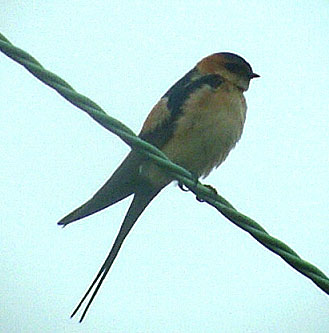 With
the spring migration in full swing April is usually a good month for birds, and
this year was particularly good. Winds coming from the south and east for much
of the month certainly helped.
With
the spring migration in full swing April is usually a good month for birds, and
this year was particularly good. Winds coming from the south and east for much
of the month certainly helped.
There were two star birds this month, both on North Wirral. Firstly a Red-rumped Swallow which was first seen on the 15th by Carr Lane, Moreton, and then stayed for a further two days giving many people great views (photo left by Henry Cook). The second star was a Stone Curlew present on the last day of the month on a ploughed field near the horse paddocks by Leasowe Lighthouse. The tenth record for Cheshire and Wirral and very close to the location one was last seen in April 2004.
It has been a very good Waxwing winter across the country but nineteen rather unexpectedly turned up in West Kirby on the late date of the 6th near Gilroy Nature Park. Eight of these hung around the area for a couple of days before dwindling down to three by the 11th.
There were 10 reports of Ospreys, although two or three may have been of the same bird, and three Marsh Harriers passed through. Three Hen Harriers remained until at least the 17th (2 ringtails and 1 male). It has been a remarkable winter for Short-eared Owls on the marshes and there were still 15 flying over Burton Marsh on the 13th. There has been quite a lot of displaying going on over the past couple of months, will any stay to breed?
As usual numbers of waders on the estuary dropped off in April but there were still 2,700 Redshank and 1,020 Curlew at Heswall on the 13th and 8,000 Knot at Leasowe the following day. Black-tailed Godwit numbers remained relatively high with about 1,000 in the Connah's Quay/Flint area and 350 at Inner Marsh Farm by the end of the month. These were nearly all first year birds (non-breeding) so will probably spend the summer here, they include the colour ringed bird OR-OR flag (see December 2008 newsletter) which was ringed as a chick in Iceland in July last year and subsequently spent most of the winter at Gilroy Nature Park and Thurstaston Shore. There was a good passage of Whimbrel with Heswall having the highest numbers with at least 76 on the 22nd. Avocets reached a peak of 22 at Inner Marsh Farm on the 9th before dropping down to 12 by the end of the month. An adult breeding plumaged Curlew Sandpiper passed all too quickly through Inner Marsh Farm on the 29th.
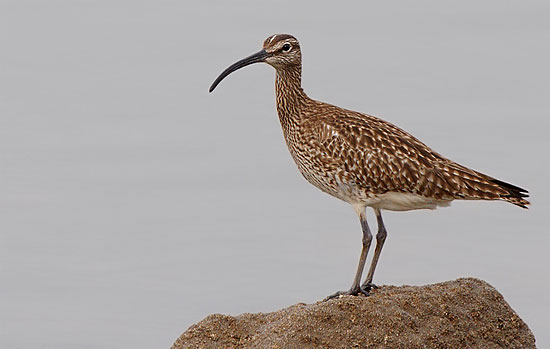
Fresh south-easterly winds on the 24th and 25th produced a good number of birds including 100 Wheatear, eight Whinchat and a Wood Warbler in the Leasowe Lighthouse area. Good numbers of Wheatear were also seen on Hilbre and at Heswall, many of these were of the Greenland race. There was a fall of at least 146 White Wagtail at Gronant on the 20th, also present was an excellent count of 20 Tree Pipits, other pipits nearby up to a total of 100 could also have been Tree Pipits but were too distant to be definitely identified. 13 Tree Pipits were at Point of Ayr five days later. Lesser Redpolls and Siskins seemed to be everywhere through the month including many coming to garden feeders. Four Mealy Redpolls, including three different ones on consecutive days on Hilbre, was an excellent number for this county rarity. A total of 16 Redstarts during the month was a good number.
The first Common Terns arrived back at their Shotton breeding colony on the 13th and there were five Little Terns at Gronant on the early date of the 21st. 12 Arctic Terns were off Hilbre on the 26th. The first Manx Shearwaters of the year flew by on the 27th with two off Hilbre and five off Leasowe. A first year Iceland Gull was observed from Hilbre on the 4th.
Two Spoonbills arrived at Burton Marsh on the 13th, one of these was colour ringed and we can trace it's history back to when it was ringed as a chick in the Netherlands Jun 10th 2007. It remained near it's nest site until August then turned up in Devon in December where it stayed all winter. A spring trip back to the Netherlands via Kent and Norfolk followed. The summer of 2008 was spent in Suffolk and Norfolk before a return trip to Devon where it was last seen on Apr 5th before arriving here eight days later.
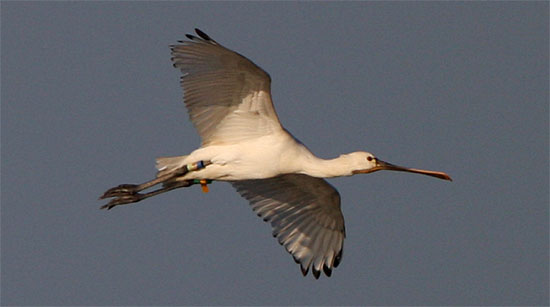
| Species | 2009 | Location (09) | 2008 | 2007 |
|---|---|---|---|---|
| White Wagtail | 4th March | Hoylake Langfields | 9th March | 13th March |
| Wheatear | 14th March | Burton Point | 13th March | 12th March |
| Sand Martin | 15th March | Hilbre | 16th March | 15th March |
| Swallow | 16th March | Leasowe | 15th March | 16th March |
| House Martin | 30th March | Inner Marsh Farm | 11th April | 1st April |
| Willow Warbler | 31st March | West Kirby | 31st March | 3rd April |
| Swift | 8th April | Inner Marsh Farm | 22nd April | 16th April |
| Whitethroat | 11th April | Meols | 11th April | 15th April |
| Cuckoo | 26th April | Deeside | 23rd April | 15th April |
Richard Smith.
What to expect in May
As is often the case May last year was exceptional for rarities with Whiskered Tern, Bluethroat, Cattle Egret, Red-rumped Swallow and Wood Sandpiper being the highlights. So just about anything can turn up this month!
There will still be plenty of birds on migration including waders such as Whimbrel and Sanderling. Sometimes large numbers of Knot and Dunlin can be seen but they never stay long as they are in a hurry to get north. I always look with awe at these birds as the ones we see in May are likely to have travelled thousands of miles with many flying all the way from South Africa to the high Arctic.
Hopefully we will get a few Spotted Redshanks at Inner Marsh Farm and the Connah's Quay Reserve looking resplendent in their summer plumage. A few of the several hundred Black-tailed Godwits which should be present may still be on their way to Iceland early in the month looking great in their breeding plumage, but most will be non-breeding bird which will stay in this country through the summer. Avocets will be breeding at Inner Marsh Farm - lets hope they are more successful than last year. A few Ospreys will still be passing through and there should be one or two Hobbies around.
The tern breeding season will get under way this month with Little Terns at Gronant and Common Terns at Shotton. If we get some fresh west winds there should be plenty of Manx Shearwaters, Common Scoters, Arctic Skuas and Gannets to be seen out to sea.
Forthcoming Events
May Highest Spring Tides (Liverpool)
Also see
Tides page.
25th May, 12.33hrs (BST), 9.4m.
26th May, 13.22hrs (BST), 9.4m.
Forthcoming Events
Organised by the
Wirral Ranger Service ,
Flintshire Countryside Service and/or the RSPB:
All these events and walks have bird interest, even those not advertised
specifically for birdwatching. No need to book for these events unless
specified - please check below.
Sunday 3rd May, 04:30hrs - 06.30hrs.
Dawn Chorus on Heathlands.
Experience this magical time of day and listen to the birdsong as the sun
rises over Heswall Dales and Cleaver Heath
Local Nature Reserves. Led by the Rangers and members of Wirral
Wildlife.
Suitable for all the family, sorry no dogs.
Meet Cleaver Heath car park, Oldfield Road off Quarry Road West and
Telegraph Road in Heswall.
Booking Essential. For further enquiries and to book call: 0151 648
4371/3884.
Tuesday 5th May, Wednesday 6th May, Thursday 7th May and Friday 8th May,
9.30am to 3pm.
Before they Tern Up!
Help prepare the
Gronant site for the arrival of Little
Terns for their breeding season. There is lots of practical work to
undertake to ensure a comfortable stay for the last colony in Wales.
Meet at Presthaven Sands Holiday Park entrance, Gronant, SJ089841. For
more information contact Adrian Hibbert by email (adrian.hibbert@denbighshire.gov.uk)
or telephone 01745 356197.
Wednesday 6th May & Saturday 9th May, 1pm - 3pm (both days).
Little Tern Volunteering Taster Day.
Gronant holds the only colony of Little
Terns in Wales. Every year, volunteers help to protect these rare seabirds
during the summer nesting period. These taster days will give you the
opportunity to meet the Wardens and the volunteers and to get a feel for
this important work.
Meet at Presthaven Sands Holiday Park entrance, Gronant, SJ089841. For
more information contact Adrian Hibbert by email (adrian.hibbert@denbighshire.gov.uk)
or telephone 01745 356197.
Sunday 10th May, 4.30am start.
Dawn Chorus Walk.
Join members of Wirral Wildlife and Wirral Countryside Rangers to hear
bird song at its best, as returning migrants join our resident birds, to
claim their territories.
This is a (very!) early morning walk through heathland and woodland,
starting at Cleaver Heath Local Nature
Reserve on Oldfield Road, Heswall.
Details: Mike Maher 0151-342-4249.
Images of Nature: a photographic exhibition
by Ron Thomas A.R.P.S.
24th - 31st May 2009, Thurstaston Visitor Centre, Wirral Country Park.
To accompany the exhibition Ron will be
giving an illustrated talk on 24th and 31st May (2 - 3.30pm) and will be
"on hand" to answer questions etc on Saturday 30th between 11am - 1pm and
again between 2 - 4pm.
Also on display will be images from students on Ron's recent photographic courses. Entry to the exhibition is free and is open 10am - 4pm. For further information call (0151) 648 4371/3884.
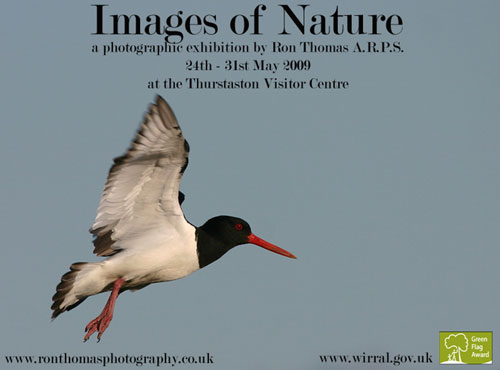
31st May and 28th June - Dragons and Damsels at
Inner Marsh Farm (RSPB event).
£3.50 members, £4.50 non-members - Looking for the scarce red-eyed
damselfly and many more.
Booking Essential - please ring 0151 3367681.
9th June - Wildlife Photography for beginners at
Inner Marsh Farm (RSPB event).
£15 for the full day session which includes expert tuition and workshops
by Ron Thomas ARPS
Booking Essential - please ring 0151 3367681.
13th and 14th June - Orchid Spectacular at
Inner Marsh Farm (RSPB event).
£3.50 members, £4.50 non-members - Fantastic displays of the orchids at
IMF.
Booking Essential - please ring 0151 3367681.
|
 |
The blank (UK) Birding Webring is a collection of quality birding web sites that are based in the United Kingdom. Visit the webring homepage for more information, or A complete list of all the sites in the webring is available by clicking here. previous site in ring : random site in ring : next site in ring |